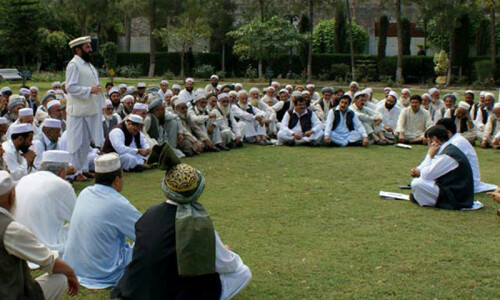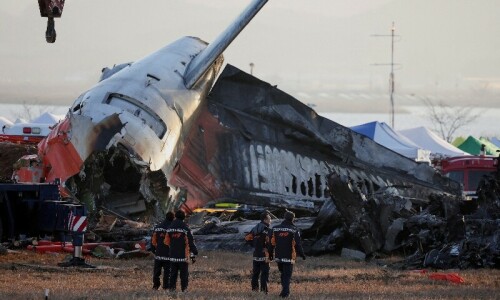Pakistan is no stranger to being plagued by multiple crises. News headlines are usually dominated by issues like terrorism, extremism and power shortage but an even more alarming danger could affect the future of Pakistan if it is not tackled on a priority basis.
The dangerous threat we all know as climate change has been virtually left off the radar by our less then visionary leaders when it comes to issues of national priority.
Environmental degradation costs Rs 365 billion annually to Pakistan and unsafe water and sanitation costs Rs 112 alone in terms of financial damage.
A comprehensive report was first highlighted in December 2012 which shows alarming trends of climate change in Pakistan.
The report entitled ‘Climate Change in Pakistan – focused on Sindh Province’ forecast low agricultural productivity from lack of water for irrigation and erratic rainfall. Conditions in the fertile Indus delta, already facing saline water intrusion and coastal erosion, are expected to deteriorate further.
Data gathered from 56 meteorological stations show heat waves increasing from 1980 to 2009, a period marked by glacier retreats, steadily rising average temperature in the Indus delta and changes in temperature pattern in summer and winter.
Ghulam Rasul, chief meteorologist at the Pakistan Meteorological Department and the main author of the report, told dawn.com that although Pakistan’s contribution to global greenhouse gas emissions is low, it is among countries highly vulnerable to climate change.
Pakistan’s largely agrarian economy, Rasul noted, is mainly fed by the Hindu Kush-Karakoram and Himalayan (HKH) glaciers that are reported to be receding due to global warming. “Pakistan’s climate-sensitive agrarian economy now faces larger risks from variability in monsoon rains, floods and extended droughts.’
Rasul said many of Pakistan’s 5,255 glaciers have been steadily losing ice mass.
The report says that the Siachen Glacier has lost 17 per cent of ice during the past 21 years.
“I urge the world to assist Pakistan to deal with climate change because the melting of the ‘Third Pole’ could result in a decrease of sunlight reflections and add to a rise in global temperature,” Rasul added.
The report strongly recommends building of climate resilient infrastructure and monitoring of the changes.
It urges that water reservoirs be built at upper catchment areas of River Indus. It also stresses for minimum environmental flow of the Indus to the lowest level in order to avoid sea intrusion.
The folks of Indus Delta
The majority of the people in Pakistan (between 60 to 70 per cent) depend on the eco-system to survive. A shepherd in Balochistan, a farmer in Punjab or a fisherman from Sindh — all rely directly on the environment for their livelihood. Unfortunately, the livelihood of these people is at risk due to climate change. From Balochistan to Sindh, Fishermen complained about the depleting fish resources in coastal areas. Photo by Reuters
From Balochistan to Sindh, Fishermen complained about the depleting fish resources in coastal areas. Photo by Reuters
A report titled ‘Community based Vulnerability Assessment’ produced by WWF Pakistan highlights the miseries of the people living in the Sindh Delta region. According to the report, Pakistan ranks at 16 in the Maplecrofts’s vulnerability index while Pakistan is also vulnerable according to German Watch Climate Risk Index.
The report, which was compiled with the support of the European Union, includes direct evidence and testimonials from the people living in the coastal areas of Keti Bunder, Kharo Chan and Jiwani who discussed the effect of climate change.
The report also reflects on the climate, environmental and economic impact on the coastal community.
Voices of the vulnerable
The report highlighted some direct and disturbing evidence from people living at the frontlines of climate change.
“About 10 years ago it used to get very cold, but now it seems as if there is very little winter and the heat has increased. In the last three years, it has rained very heavily,” a woman from Keti Bunder reveals.
Interestingly, this evidence confirms the report compiled by Rasul.
“We have been very unsuccessful because rain does not occur. We are selling our livestock. We do not know how to face climate change,” a male villager from Jiwani, Balochistan said.
“Due to rise in the temperature crops shrink,” another female interviewee from Kharo Chan said.
The report also states that almost all participants in Balochistan and Sindh agreed that the seasons and weather pattern has changed over the last 10 years.
Different ailments caused due to the rise in temperature have created further difficulties for the people, who were already living below the poverty line.
“There is malaria, diarrhea, itching and fever. In six months, we visit the doctor 5-6 times. Hospital is free but medicine can go up to Rs. 500. If we need further treatment, we have to go to Gwadar for which the traveling cost comes up to Rs 1000,” a woman from Jiwani said, adding that if the illness gets worse, the villagers need to go to Karachi which costs around Rs 15000.
Many farmers from Thatta ( Sindh) and Gwadar ( Balochistan) are facing agricultural challenges such as soil, infertility and shifting of rainfall along with the burden of debt.
According to the report, people working in the fields complained mainly about scarcity of water, droughts and uneven rainfall. Similarly, from Gwadar to Keti Bunder majority of fishermen shared their experience about depleting fish resources, low catch and said that some species had disappeared all together.
The findings of the report highlight an urgent need of mitigation, adaptations and awareness for the silent majority living in the coastal and deltaic areas of Pakistan. Pakistan should also take immediate steps to implement its first ever climate change policy and above all, an empowered institute is required to check and ensure the betterment of the River Indus – which is a life line for Pakistan.














































Dear visitor, the comments section is undergoing an overhaul and will return soon.